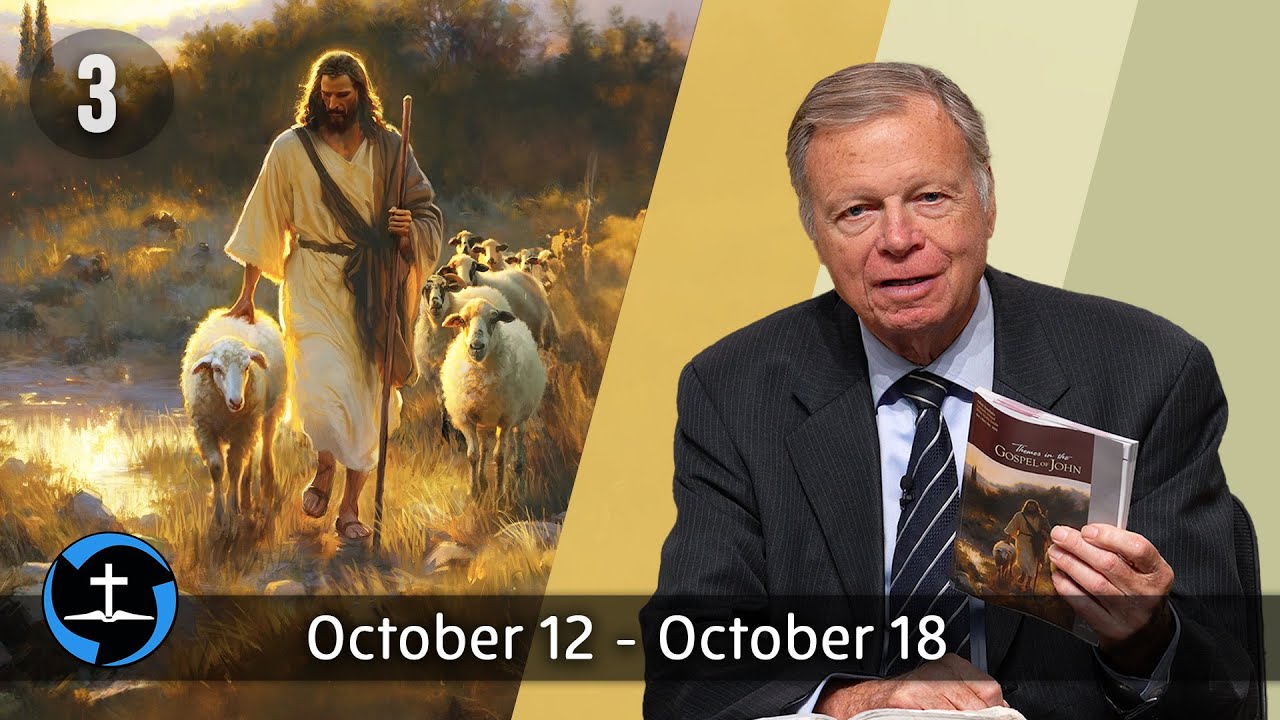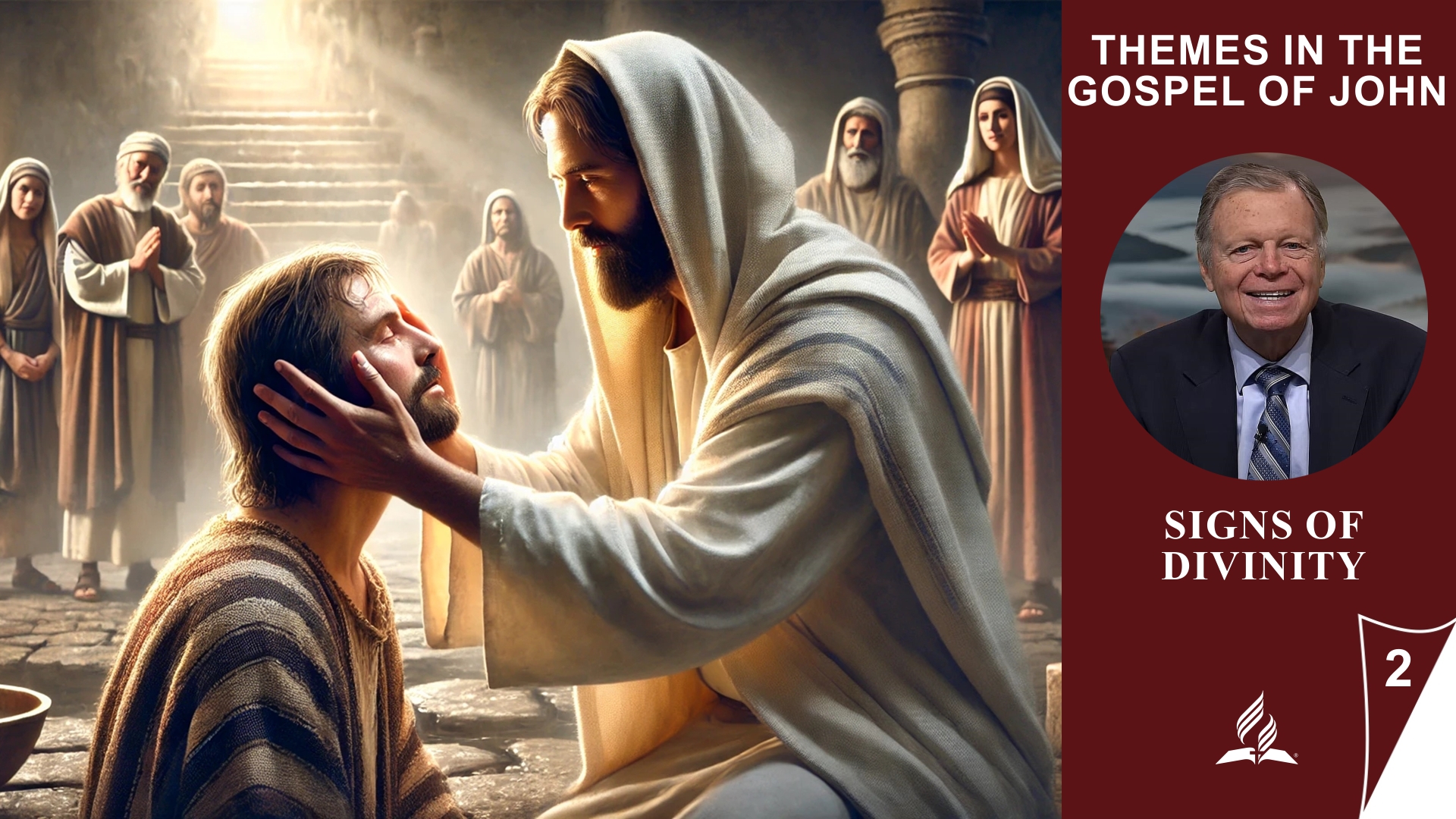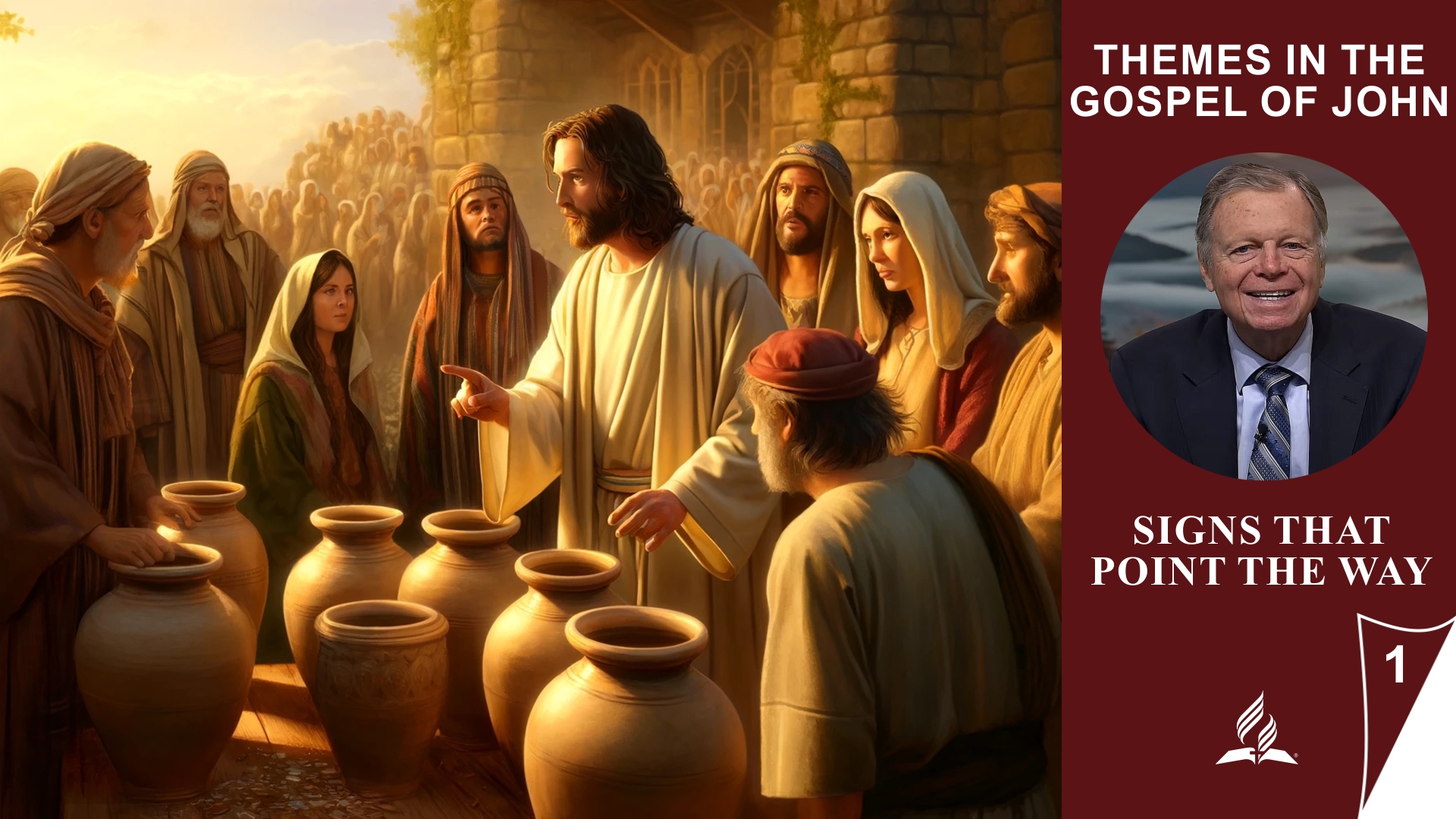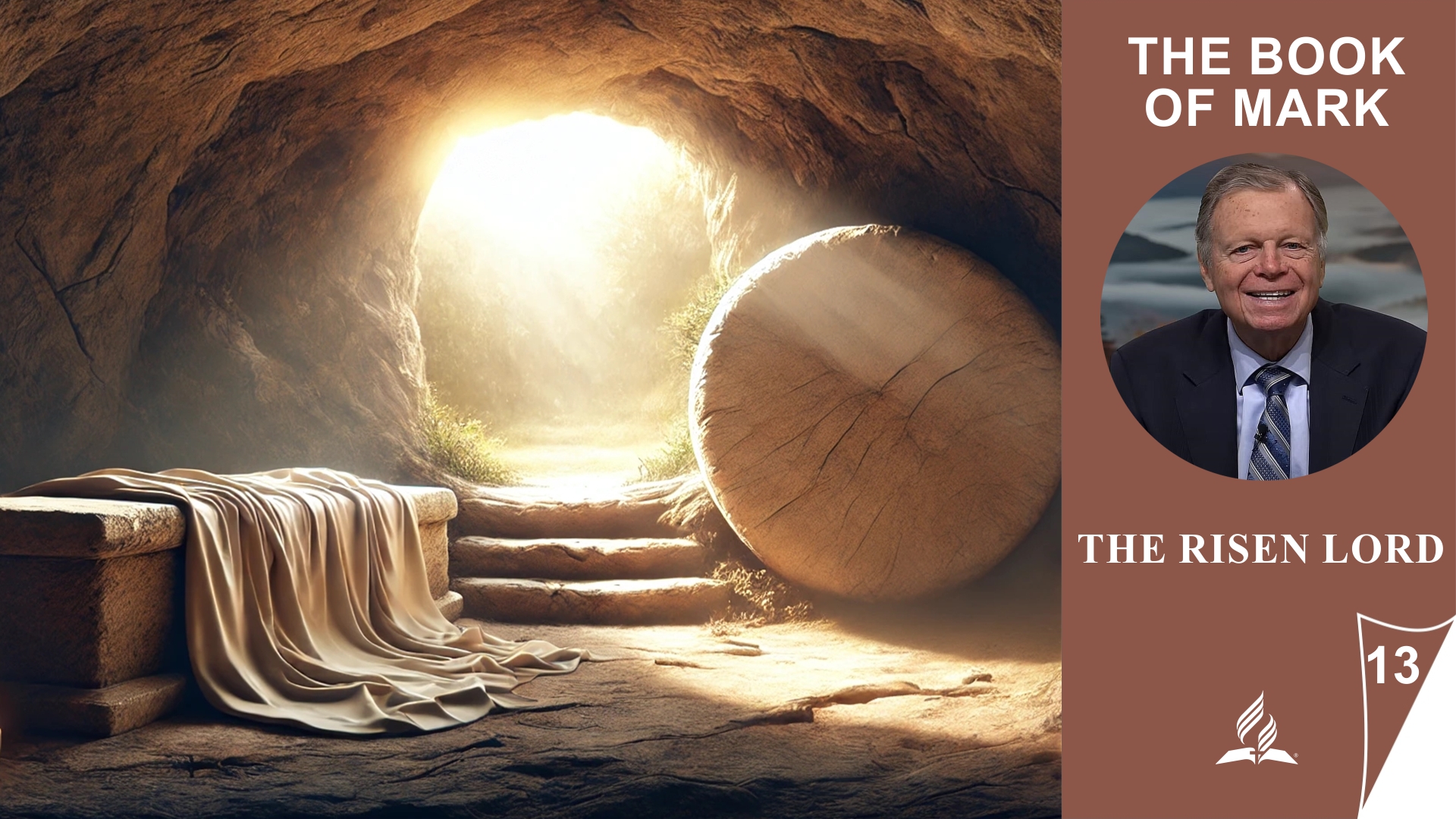
Themes in the Gospel of John – Lesson 2.Signs of Divinity | Sabbath School with Pastor Mark Finley

Series JESUS IN THE GOSPEL OF JOHN with Pastor Mark Finley |
Lesson 2.Signs of Divinity |
The Revelation of Jesus’ Divinity through His Miracles |
Lesson 2 explores the signs and miracles that reveal Jesus’ divinity. Through the Feeding of the Five Thousand, the Healing of the Blind Man, and the Raising of Lazarus, Jesus not only demonstrates His power over the physical world but also His role as Redeemer and Giver of Life. These miracles serve to point people towards a deeper spiritual truth: Jesus is the promised Messiah who has come to save humanity. His actions make it clear that He is not merely a prophet or teacher, but the divine Son of God. This realization invites believers to have faith in Him and receive eternal life.
Memory Text: John 11:25,26 – “Jesus said to her, ‘I am the resurrection and the life. He who believes in Me, though he may die, he shall live. And whoever lives and believes in Me shall never die. Do you believe this?’”
Content:
2.1 The Feeding of the Five Thousand
The Revelation of Jesus’ Divinity through the Feeding of the Five Thousand
In the story of the Feeding of the Five Thousand, John deliberately points to the temporal proximity to the Passover festival to highlight the parallel between Jesus and Moses. Just as Moses led the people of Israel in the wilderness and provided manna through God’s power, Jesus multiplied the loaves to feed the people. This act recalls the liberation from Egypt and symbolizes that Jesus is the new Moses who has come to finally free His people. The twelve baskets of leftovers refer to the twelve tribes of Israel, emphasizing the completeness and God’s care for His people. Through this act, Jesus not only shows His power but also His divinity by revealing Himself as the true Passover Lamb, sacrificed for the sins of humanity. This is particularly confirmed by Isaiah 53 and 1 Peter 2, which emphasize that Jesus took upon Himself our sins to redeem us—a truth that forms the foundation of our faith.
2.2 “Surely, He Is the Prophet”
Jesus’ Revelation as the True Bread of Life
In John 6:14–15, the people responded to Jesus’ miracles with the desire to make Him their earthly king, as they saw Him as the expected prophet who could politically liberate them. However, Jesus tried to shift their attention from the material miracles to the spiritual truth: He is the “Bread of Life” that came down from heaven to give eternal life to people. However, the people did not understand that Jesus came to free them from sin, not from political oppressors. Jesus’ “I am” statement (“I am the Bread of Life”) refers to His divinity, as revealed in Exodus 3:14. Yet the crowd was primarily seeking short-term benefits rather than recognizing the deeper spiritual significance of His mission.
2.3 The Healing of the Blind Man, Part 1
The Revelation of God through the Healing of the Blind Man
In John 9:1–16, the disciples thought that the man’s blindness was the result of sin, either his own or his parents’. Jesus corrected this assumption by explaining that the blindness was not due to sin, but that through this suffering, the works of God would be revealed. Jesus’ healing of the blind man by using mud to heal him recalls creation when God formed man from the dust of the earth. John’s account emphasizes less the healing itself and more the ensuing discussion, particularly the growing faith of the blind man and the increasing confusion of the Pharisees. Although the Pharisees saw Jesus’ healing on the Sabbath as a breach of the law, the miracle caused division among them as some could not believe that a sinner could perform such signs.
2.4 The Healing of the Blind Man, Part 2
The Spiritual Blindness of the Pharisees and the Growing Insight of the Healed Man
In John 9:17–34, the Pharisees repeatedly question the formerly blind man to challenge the authenticity of his healing and Jesus’ identity as a sinner. The man responds increasingly confidently, explaining that Jesus healed him and that no one who does not come from God could perform such a miracle. As the blind man gains more spiritual insight and believes in Jesus, the Pharisees become more obstinate and reject Jesus. This healing story shows a reversal of roles: the once blind man now sees clearly, while the religious leaders remain in their spiritual blindness. They refuse to recognize the obvious and expel the healed man from the synagogue. This story reminds us that true knowledge and wisdom are often given to those who are humble and open, as Paul emphasizes in 1 Corinthians 1:26–29, while worldly wisdom can be blinded.
2.5 The Resurrection of Lazarus
Jesus’ Power Over Death and the Revelation of His Divinity
The raising of Lazarus in John 11 is one of Jesus’ most powerful miracles and clearly demonstrates His divine power over death. Despite the mourning over Lazarus’ death and Jesus’ apparent hesitation, the delay served a higher purpose: the revelation of God’s glory and the confirmation that Jesus is the “Resurrection and the Life.” By raising Lazarus from the dead after four days in the tomb, Jesus proved that He has power over death and that through faith in Him, eternal life is possible. This miracle underscores the central message of the Gospel of John: Jesus is the divine Son of God, and through Him, we can receive true life. Yet, despite this incredible evidence, many of the leaders responded with disbelief and conspiracy, highlighting human blindness to divine wisdom.
2.6 Summary
The Revelation of Jesus’ Divinity through Miracles and Signs
In Lesson 2, Jesus’ divinity is clarified through various miracles and signs. In the Feeding of the Five Thousand, Jesus demonstrates His provision as the true “Bread of Life,” fulfilling people’s spiritual needs. The healing of the blind man reveals not only Jesus’ power over physical blindness but also the growing spiritual insight of the healed man in contrast to the Pharisees’ spiritual blindness. In the raising of Lazarus, Jesus demonstrates His power over death and reveals Himself as the “Resurrection and the Life.” These miracles confirm that Jesus is the divine Son of God who brings eternal life.
Themes in the Gospel of John – Lesson 1.Signs That Point the Way | Sabbath School with Pastor Mark Finley

Series JESUS IN THE GOSPEL OF JOHN with Pastor Mark Finley |
Lesson 1.Signs That Point the Way |
The Revelation of Jesus through Miracles |
In this first lesson, we focus on the significant signs and miracles of Jesus as portrayed in the Gospel of John. Central to this is the miracle at the wedding in Cana (John 2:1–11), which serves as the first public sign of Jesus’ divine authority. Through the transformation of water into wine, Jesus not only reveals His power but also provides concrete evidence to His disciples and the attending guests that He is the promised Messiah. This miracle symbolizes the connection between the earthly and the divine and points to the forthcoming redemption that Jesus will bring for humanity. By examining this and other miracles, we gain a deeper understanding of how Jesus’ actions strengthen faith and guide the way to Him. These signs are not merely impressive deeds but carry a deeper spiritual significance that invites us to explore the true identity of Jesus and the impact of His works on our own lives.
Memory Text: John 20:30.31 – “And truly Jesus did many other signs in the presence of His disciples, which are not written in this book; but these are written that you may believe that Jesus is the Christ, the Son of God, and that believing you may have life in His name.”
Content:
1.1 The Wedding at Cana
Signs That Show the Way
The miracle that Jesus performed in Cana, where he turned water into wine (John 2:1–11), was the first sign of his divine authority. This miracle not only revealed his power but also served as evidence for his disciples, who were strengthened in their faith through this event. By acting at a wedding—a place of joy and celebration—Jesus demonstrated that he engages with both the ordinary and the spiritual aspects of life. This sign also alludes to the Old Testament theme of liberation and redemption, similar to Moses leading the Israelites with signs and wonders. The miracle at Cana was a foreshadowing of the future redemption that Jesus would bring for humanity.
1.2 The Second Sign in Galilee
Faith Strengthened by Miracles
The second sign, which Jesus performed in Galilee by healing the son of a royal official (John 4:46–54), deepened the faith of his disciples and the surrounding people. John makes a deliberate connection to the first miracle in Cana to illustrate that Jesus’ signs are meant to strengthen faith. Despite Jesus’ seemingly harsh response, the official recognizes the spiritual dimension of his request and trusts Jesus’ words. The royal official realizes that faith in Jesus does not depend on visible miracles but on trusting his promises. Through this miracle, it becomes clear that Jesus heals not only physically but also spiritually.
1.3 The Miracle at the Pool of Bethesda
Healing Beyond the Expected
At the Pool of Bethesda, where the sick hoped for a miracle in the water, Jesus brought healing in an unexpected way (John 5:1–9). When he asked the paralyzed man if he wanted to be healed, he made it clear that true healing would not come from the pool but from himself. The man, who had waited for the water to move for years, found healing in Jesus’ words: “Get up, take your mat and walk!” Through faith in Jesus’ command, he immediately experienced the power of God. This miracle shows that true healing is often not found where we look for it but in encountering Jesus.
1.4 Hard Hearts
Blindness Despite the Miracle
The miracle at the Pool of Bethesda not only revealed Jesus’ power but also the hardening of the religious leaders’ hearts (John 5:10–16). Instead of praising God for the miracle of healing, they criticized Jesus for healing on the Sabbath. This reaction shows how people can become blind to God’s work when they cling to rigid traditions and human rules. Their rejection of Jesus illustrates that spiritual blindness often arises from pride and false expectations. Jesus’ warning to them reminds us to examine our own hearts so that we do not overlook the truth that could lead us to freedom.
1.5 Jesus’ Claims
The Claim to Divinity
The miracle at the Pool of Bethesda provided Jesus the opportunity to reveal his divine authority. The religious leaders persecuted him not only because of his Sabbath healing but also because he referred to God as his Father, which they saw as blasphemy (John 5:16–18). Jesus defended his actions by explaining that he acts in harmony with the Father, just as God continues to work on the Sabbath to sustain the universe. In John 5:19–47, Jesus demonstrates through his words and witnesses that his claim to divinity is confirmed by his miracles and the Scriptures. The leaders, who referred to the Law of Moses, missed the true meaning of Jesus’ work and mission.
1.6 Summary
Miracles That Create Faith
The miracles that Jesus performed in the Gospel of John serve as signs that reveal his divine identity and strengthen his disciples’ faith. Each of these signs, beginning with the wedding at Cana, carries a deeper spiritual meaning and points to Jesus as the Savior. The healing of the royal official’s son and the paralyzed man at the Pool of Bethesda not only affirm Jesus’ power but also his authority over physical and spiritual healing. These signs call people to recognize Jesus not only as a miracle worker but as the Messiah and Son of God. Despite the obvious miracles, the religious leaders persisted in their rejection, highlighting the danger of spiritual blindness.
SATIRE: Pastor’s Husband Sick of Being Judged on Terrible Flower Displays

Local pastor’s husband R. N. Down could not be prouder of his wife and her ministry to their congregation. And while he is trying hard to be supportive, he’s sick and tired of all the judgy members that seem to think it is his (unpaid) job to do everything from potluck and song service coordination […] Source: https://atoday.org/satire-pastors-husband-sick-of-being-judged-on-terrible-flower-displays/
The Book of Mark – Lesson 13.The Risen Lord | Sabbath School with Pastor Mark Finley

Series THE BOOK OF MARK with Pastor Mark Finley |
Lesson 13.The Risen Lord |
The Resurrection of Christ: Foundation of Christian Faith and Hope |
Lesson 13 deals with the decisive event in Christian history: the resurrection of Jesus Christ. The Gospels report how women discovered the empty tomb and were the first to receive the message of the resurrection. Despite initial doubt and disbelief among the disciples, Jesus appeared several times after his resurrection. These encounters strengthened their faith and led them to boldly spread the Gospel to the entire world. The resurrection is the foundation of the Christian hope for new life and the central event that shapes the faith of the disciples and Christians to this day.
Memory Text: Mark 16:6 – “But he said to them, ‘Do not be alarmed. You seek Jesus of Nazareth, who was crucified. He is risen! He is not here. See the place where they laid Him.’ ”
Content:
13.1 Rejoicing in the Resurrection
Hope and New Life in Christ
The resurrection of Jesus is the central point of the Christian faith and symbolizes the victory over death. In Mark 15:42–16:6, it becomes clear that Jesus was quickly buried after his death because the Sabbath began. However, on Sunday morning, the women discover the empty tomb and learn of the resurrection. This is significant as it confirms the fulfillment of Jesus’ promises and the beginning of new life for believers. Although the New Testament does not teach a specific sanctification of Sunday but views baptism as a symbol of the resurrection, the joy over Jesus’ victory over death is universal. This resurrection gives us hope for our own new life in Christ, as Peter describes in 1 Peter 1:3.
13.2 The Stone Was Rolled Away
Testimonies and Evidence of the Resurrection
The resurrection of Jesus is central both in the Gospel of Mark and in the First Letter to the Corinthians. Both texts emphasize the essential elements: Jesus died, was buried, rose again, and was seen by many witnesses. Particularly notable is that Mark 16:7 announces the disciples’ encounter with the resurrected Jesus in Galilee. These accounts underscore that the resurrection is not only a matter of faith but is supported by many witnesses. Even skeptical historians acknowledge the empty tomb, which makes the resurrection more credible. The transformed lives of the disciples and their bold testimony are strong indications of the truth of the resurrection.
13.3 The Women at the Tomb
From Silence to Proclamation
The women who arrived at Jesus’ tomb were deeply grieved and expected to anoint Jesus’ dead body. The possibility that Jesus had risen was not on their minds. However, when they learned the message of the resurrection, they first reacted with fear and amazement and remained silent about it. This reaction reflects the recurring theme in the Gospel of Mark, where Jesus often commands the concealment of his true identity. However, this silence does not last long. At the end of the Gospel, the disciples spread the message of Jesus’ resurrection everywhere, symbolizing the overcoming of silence and the proclamation of the good news.
13.4 Appearing to Mary and Others
First Witnesses of the Resurrection: The Unexpected Role of Women
Mark 16:9–20 adds crucial details to the resurrection account that support the testimonies of the first witnesses and the later proclamation. It is emphasized that Mary Magdalene was the first to see the resurrected Jesus—a significant fact since women did not hold high status as witnesses in that society. If the story had been fabricated, men would likely have been named as the first witnesses. However, the disciples initially did not believe her, showing their human weakness and doubt. Jesus had to later rebuke them for their unbelief. Their subsequent bold proclamation of the risen Christ, however, stands as strong evidence for the truth of their experience.
13.5 Go into All the World
The Mission to Proclaim: Jesus’ Message to All Nations
In Mark 16:14–20, Jesus first rebukes his disciples for their unbelief and hardness of heart before giving them the command to carry the Gospel to the entire world. This command remains relevant today: Christians are called to proclaim the message of salvation to all people. Jesus promises that signs and wonders will accompany their work, not as spectacles but as protection and confirmation of their mission. His ascension into heaven and the assurance that he works with his disciples give us today the certainty that he is present in our proclamation and work.
13.6 Summary
The Resurrection of Jesus: Hope and Proclamation by the Disciples
The resurrection of Jesus is the central belief of Christianity and is thoroughly testified in the Gospels and other New Testament texts. Women, the first witnesses of the empty tomb, played an unexpected and significant role in proclaiming the resurrection. Despite initial unbelief and doubt among the disciples, Jesus confirmed his resurrection through several appearances. These encounters strengthened the disciples’ faith and led to the proclamation of the Gospel throughout the world. The resurrection gives believers hope and the assurance of eternal life.
- « Previous Page
- 1
- …
- 9
- 10
- 11
- 12
- 13
- …
- 385
- Next Page »
